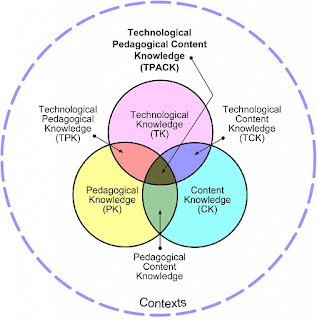TPACKs insufficient transitional model

The currently popular TPACK model separates technology knowledge from pedagogy and content, viewing technology as a set of basic operational skills with a thing or things. This might be useful if it will be seen as the insufficient perspective that it provides. It is the equivalent to saying that writing is the basic operational skill with pencils, pens, books and paper, with skill in using and safely storing and organizing the data put on them, with skill in installing and removing books and articles and switching out procedures for different writing sequences and using the postal service. Yes, we needed to know those things to think with text for the last several centuries, and we need to know basic digital skills for the 21st century but this perspective loses sight of the forest for the trees. TPACK is a transitional digital immigrant perspective forced on education by its low socio-economic status in our culture. Education’s SES has long prevented digital technologies from be...


